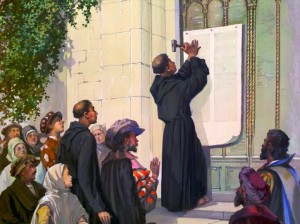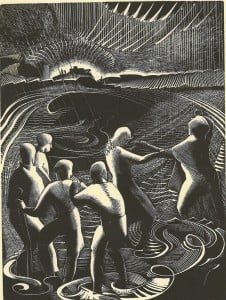Martin Luther had some serious chutzpah.
Though his well-documented anti-Semitism sowed some noxious weed-seed in both his theology and throughout the Protestant church culture that emerged from the Reformation, I’ve always admired the stories of Luther’s battles with unhealthy church culture. Luther was a monk, a Catholic church insider. He had every reason to support the status quo of the church at the time, which had grown into a bloated, powerful bureaucracy designed to benefit people in positions like his. Though history remembers Luther as a spiritually-intense, blunt, and brash man, he functioned in his day as a blustering German canary in a coal mine, alerting the Church to the noxious fumes smothering and distorting the gospel.
 On October 31, 1517, Luther reportedly crawled up the steps of the church in Wittenberg and nailed his list of grievances to the door about the way the church had been conducting “salvation business”. Reading his 95 theses, it is obvious he is writing as a heartbroken insider, not a rabble-rousing agitator. I understand he never intended to start a new denomination. He simply wanted to call the church to return to who she was supposed to be.
On October 31, 1517, Luther reportedly crawled up the steps of the church in Wittenberg and nailed his list of grievances to the door about the way the church had been conducting “salvation business”. Reading his 95 theses, it is obvious he is writing as a heartbroken insider, not a rabble-rousing agitator. I understand he never intended to start a new denomination. He simply wanted to call the church to return to who she was supposed to be.
Luther wasn’t the first reformer by a long shot. If you think about it, the Apostle Paul wrote almost all of his letters to infant churches already in need of reform. By the third century, the same reformer’s impulse at work in Luther drove the Desert Fathers and Mothers into the wilderness to seek God because the Church had gotten too comfy with the world. Throughout history, there have always been reform movements in the Church. These prophetic voices usually echo the call of John the Baptizer, then Jesus: “Repent, for the kingdom of God is at hand.”
Now, almost 500 years after Luther’s viral blog post on the doors of the church in Wittenberg, reforming is so much a way of life for us in the big C church that its estimated there are more than 33,000 denominations in the world. This includes more than 200 groups situated within the Catholic church, nearly 800 within the Eastern Orthodox branch of the family tree, as well as thousands upon thousands of Protestant groups – the children of Luther, Calvin, Menno Simons, as well as Bill Hybels, John Wimber and maybe even your pastor, who may have decided to plant a church after falling into disagreement with someone over doctrine or paycheck or building program. We may not have mastered love for one another very well, but for better or for worse, by golly, we have gotten the hang of reformation.
Ecclesia semper reformanda est is a fancy way of saying that the Church is always in need of reforming because each one of us as individuals – we the members of his single Body here on earth – are always in need of reforming. We are not there yet; we are all of us on a pilgrim’s road trip. The Reformation has taught us how to divide. In some cases, the division has been a good and necessary pruning process. In other cases, it has been a loveless destruction of the unity for which Jesus prayed. It’s sowed seeds just as noxious as the seeds of Luther’s toxic anti-Semitism.
My most joyful moments as a believer have always, always come as I’ve learned and worshipped and gone on retreat with people who aren’t in my particular local church. This is how it will be at the end of days, and it is what Jesus prayed for us until the end arrives. I believe that true, Spirit-wrought unity is the mark of the kingdom, and is the ultimate reformation of them all.
My prayer is not for them alone. I pray also for those who will believe in me through their message, that all of them may be one, Father, just as you are in me and I am in you. May they also be in us so that the world may believe that you have sent me. I have given them the glory that you gave me, that they may be one as we are one—I in them and you in me—so that they may be brought to complete unity. Then the world will know that you sent me and have loved them even as you have loved me. (John 17:20-23)
Your kingdom come, Lord Jesus. Your will be done among us on earth as it has already been done in heaven.
In your experience, has the Protestant Reformation been a boon or a bane to the Church? Why do you say so?















